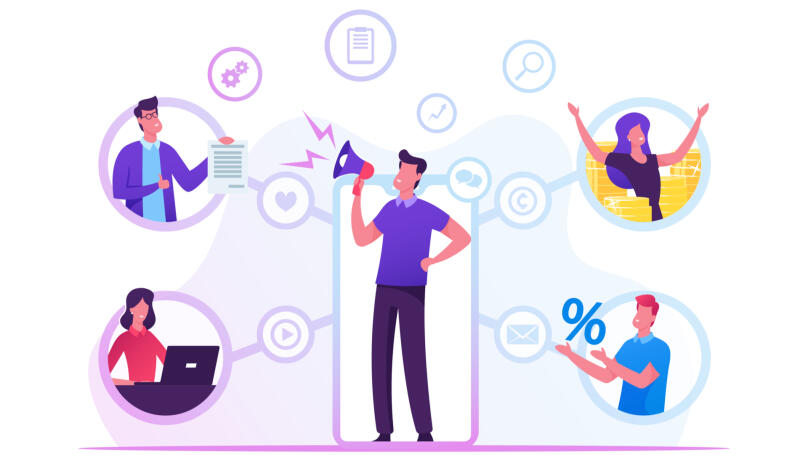The psychology of selling. How to find an approach to any client
No matter what you are selling, you must never forget that your customer is a human being, and you must take into account their psychological state, attitudes, and needs.

There are situations where your product suits your customer perfectly, but they refuse to buy it for reasons that they cannot formulate themselves. The reason for such a refusal may be the seller's inattention to the psychological state of the client.
That is why sales psychology plays a key role when selling high-value products. For mass consumption products, psychology is also critical, but remember that in this case, the salesperson has much less time to work individually with each customer, so they use unified forms and algorithms. Let's talk about what the seller needs to know about the buyer's psychology and how to seal the deal. This article is based on the course "Incredible Salesman: How To Sell Anything to Anyone".
Check out the entire course program following this link.
Learn more about the buyer

Understanding who you are selling to and what you are selling is essential for good results. This understanding helps you choose the right tools and be as persuasive as possible to the buyer.
If you are selling an expensive product or a large consignment of goods, focus on researching your buyer - a specific person or company. Study the company's webpage, search engine information, and social media profiles. If your customer is a particular person, it is worth researching their social media profiles, including Linkedin, and scouring the internet for information about them.
Researching customer information is particularly useful in cold sales. In this case, gaining the customer's trust can be extremely challenging. The information will help you choose the right tone of the conversation and eventually find a way to approach the customer.
Focus on the customer
Consider a typical description of a company in the "About us" section. For instance, "We have been on the market for so many years", "We have received such and such awards", or "We cooperate with such and such partners." Most likely, this description would fail to evoke anyone's interest. The client is looking for information about the company not to trace its development path but rather to determine whether or not the manufacturer can solve their problem. They aren't interested in an abstract description.
Any text that the client reads (for example, a description of the company or its email newsletter) must be useful for the customer. This rule applies to any company materials, blog, videos, and, of course, the seller's interaction with the client. Information about the company that the client is interested in is:
- A commercial offer. What kind of product is the company offering? What is the USP (Unique Selling Point)?
- The differences from competitors. What is the difference between the company's product and its competitors? What is the justification for its price?
- The benefits. What are the benefits of this offer to the client? It is extremely important to describe the company's commercial offer and its differences from competitors regarding the benefits for the client and emphasize these benefits.
Keep it simple
When talking with the client about the company, avoid oversaturating them with technical terms that will confuse the potential customer. It's better to simplify your speech as much as you can to be easily understood.
Texts and other materials for the customer should be comprehensible, be visualized, and not overly lengthy. Confirm your words with photos, statistics from reputable researchers, and so on. It is better to abandon complex sentences that are difficult for the reader or listener to grasp.
Lectera’s Online Courses by topic
Build trust first, then sell

Customers are wary of sellers' promises. There are reasons for this: often, after buying a product, customers learn that the promises don't equate with reality. Then, of course, trust between buyer and seller is damaged, sometimes irrevocably. Therefore, before selling a product, it is necessary to win the trust of the customer.
To gain the potential customer's trust, you need to offer them a solution to the problem or something useful. This trick works for both premium and mass-market products. The customer won't buy an expensive item straight off the bat: first, they receive a free product (this may include text, such as instructions for solving a specific problem), then the customer is given the opportunity of purchasing an inexpensive product. If a cheap product meets the customer's expectations, they buy an expensive item.
Ask the right questions and listen to the answers
Whatever sales pitch you use, you can't use it without considering the customer's characteristics: what they want to do, what results they want to get, and their personality traits. All of this is easy to find out. All you have to do is ask the client directly and interpret the answer correctly.
Before meeting with the customer, prepare a list of questions. However, one caveat, don't religiously follow this list to the letter: try to adapt to the customer during the conversation. If they don't want to answer a specific question, don't insist. Ask the question differently; try to get the information you're interested in with other questions.
Interest is your ace in the hole when talking to your customer. People like to talk about themselves and what they love. Make it clear that you are interested in understanding the client's problems, and they will tell you what you want to know.
And remember that customers are people just like you and me. They may not feel well, be in a bad mood, frustrated, or, when it's good timing, they can be in a good mood, and then quickly agree to buy. A good salesperson needs to read the customer's state and find an individual approach to it.
Lectera’s Online Courses by topic
Share this with your friends via:
Latest News

In the UK, £23 million has been allocated for the expansion of the EdTech Testbed program — pilots of educational technologies in schools and colleges.

In the US, Tuskegee University announced the launch of Tuskegee University Global Campus (TUGC) — a new online platform for distance learning.

A significant stage in the development of the alternative education system has begun in West Northamptonshire in the UK: the County Council is actively calling on parents, guardians, and trustees to participate in shaping the future of this key area.

Outwoods Primary School in Atherstone, Warwickshire, having experienced deep sadness after the loss of their famous cat, Silla, has found solace in a new pet – a Maine Coon named Aloysius O’Hara.

In modern universities, artificial intelligence, and in particular ChatGPT, is rapidly transforming from a controversial tool into a full-fledged student assistant.












 £23 million allocated for the expansion of EdTech Testbed in the UK
£23 million allocated for the expansion of EdTech Testbed in the UK
 Tuskegee University launches Global Campus — a new online platform
Tuskegee University launches Global Campus — a new online platform
 Test: How Psychologically Mature Are You? Check Your Inner Foundation.
Test: How Psychologically Mature Are You? Check Your Inner Foundation.
 Test. Check Your Social Media Dependency Level!
Test. Check Your Social Media Dependency Level!
 Test: What Business is Right For You?
Test: What Business is Right For You?
 Test: How Prone Are You to Abusive Behavior as a Manager?
Test: How Prone Are You to Abusive Behavior as a Manager?
